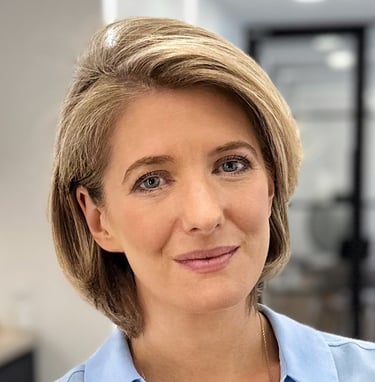31. How do you build a business that is smarter than you?
In this episode we answer the question: How do you build a business that is smarter than you? Our guest is Jennifer Sundberg, the co-CEO of Board Intelligence and author of Collective Intelligence.


Listen Now
We discuss the following with Jennifer:
Why is it so hard to get great conversations in business review meetings?
How do you get good at asking the right questions?
How do you develop the habit of asking good questions in the organisation?
How do you create phenomenal meetings?
How do you cut through obfuscation of underperformance in business review meetings?
What are the two types of conversations in management meetings?
Are written documents the elixir for creating better meetings?
References
Biography
Jennifer is the founder and co-CEO of Board Intelligence, a mission-led technology firm that helps transform boards and leadership teams into a powerful driver of performance and a force for good.
Jennifer has won numerous awards, including EY Entrepreneur of the Year for London & South East and The Times Young Business Woman of the Year, and has held regular columns with Management Today and the Financial Times.
Together with co-CEO Pippa Begg, Jennifer has authored a book published in November 2023, titled ‘Collective intelligence: How to build a business that’s smarter than you are’.
Listen Now
Summary
Using electric currents for beauty. 0:05
Bethany Ayers discusses her concerns about her appearance, particularly the jowls and lower face area, and how she has been using microcurrent therapy to address these issues.
Brandon responds to Bethany's concerns and provides his own thoughts on the topic, including his belief that face exercise is important for maintaining a youthful appearance.
Bethany discusses her use of electric currents on her face to reduce the appearance of jowls and improve her appearance, despite being a feminist who questions the societal pressure to conform to beauty standards.
Bethany mentions the Ziip Halo, a product she uses for its anti-acne and nano current features, which she believes have helped reduce her breakouts and improve the appearance of her skin.
Effective questioning and meeting strategies. 5:20
Bethany highlights the importance of asking simple and open-ended questions that encourage critical thinking and problem-solving, rather than complex and leading questions that can limit the conversation.
Brandon shares how he has shifted from a more directive and challenging approach to a more curious and why-focused line of questioning, which has led to better results in his conversations.
Bethany prefers meetings with a clear purpose and aligned attendees, avoiding unnecessary or unproductive gatherings.
Bethany suggests opening meetings with a clear agenda and checking alignment among attendees to maximize productivity.
Effective meeting practices and pre-reads. 9:52
Bethany and Brandon discuss the importance of periodically reviewing the purpose and format of meetings to ensure they remain useful and productive.
Preparing pre-read materials for substantial topics to be debated in leadership meetings can help align everyone and lead to better decisions.
Bethany highlights the importance of clarity in pre reads, emphasizing that without it, people may interpret the document differently and have a harder time having a productive conversation.
Brandon agrees and adds that pre reads can be used for more than just making a decision, such as for awareness or understanding the background of a topic.
Improving board meeting quality through skills development. 14:11
Jennifer Sundberg highlights the importance of critical thinking, communication, and focus on what matters most in board information.
She emphasizes that these skills are not unique to boards and have far-reaching implications for management teams and organizations as a whole.
Asking the right questions in a structured manner. 16:21
Bethany and Jennifer discuss the importance of asking the right questions in a framework, with Bethany sharing her experience of iteratively refining questions over time.
Jennifer Sundberg suggests using a set of pre-defined questions, called QDs, to help employees think critically and structure their thoughts before writing a report or presentation.
She recommends limiting the number of major questions to 5-7 to maintain clarity and avoid overwhelming the receiver with too much information.
Improving performance reports by asking simple yet effective questions. 19:25
Jennifer Sundberg highlights the importance of addressing the "so what" question in performance reports, as it helps to identify the risks and opportunities on the horizon.
Bethany shares her experience of working with teams who struggle to provide meaningful commentary on data visualizations, despite the importance of contextualizing the information.
Jennifer Sundberg shares a story about EasyJet's CEO Carolyn McCall, who prioritized employee well-being by asking "how do our people feel?" in every meeting and report, shifting the organization's focus to people and ultimately improving profits.
Effective questioning in meetings and leadership. 23:37
Jennifer Sundberg emphasizes the importance of asking the right questions in meetings to ensure accountability and precision.
She suggests using a software platform or knowledge management system to cascade questions across the organization and update them easily.
Jennifer Sundberg emphasizes the importance of asking questions in meetings to encourage open conversations and address underperformance.
Bethany raises concerns about politics and lack of clarity in meetings, and suggests addressing cultural issues to facilitate open communication.
Leadership meetings and their differences. 29:01
Brandon observes that a casual coffee chat with colleagues leads to more open and organic discussions, resulting in valuable insights and revelations.
Jennifer suggests grouping agenda items into steering and supervisory categories, with separate meetings to accommodate different modes of thinking and responsibilities.
Effective communication through visual aids and self-explanatory reports. 31:42
Bethany raises an issue with the assumption that reports must be written in prose, citing her own dyslexia and preference for visual aids.
Jennifer agrees, emphasizing the importance of preparing self-explanatory materials that can stand on their own without a verbal narrative to support them.
Jennifer Sundberg emphasizes the importance of critical thinking in report production, suggesting that the process of creating these documents can lead to valuable insights and improved outcomes.
